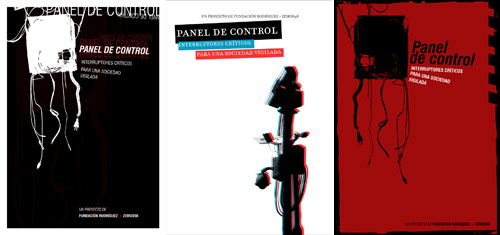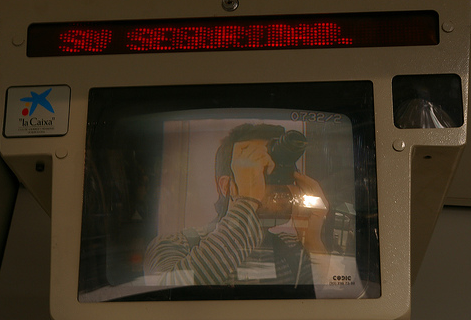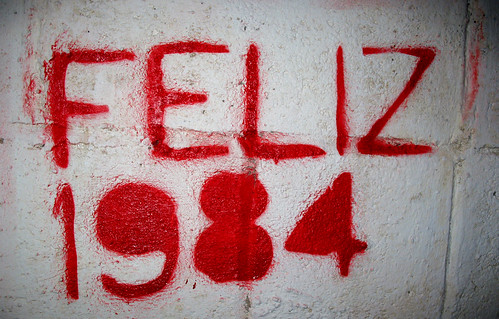Panel de Control. El libro
Llevamos varios meses preparando el próximo libro del colectivo ZEMOS98 que, junto a Fundación Rodríguez, queremos presentar a finales de noviembre. Iremos avanzando algunas cosas en este blog, ya que el libro también llevará por título "Panel de Control. Interruptores críticos para una sociedad vigilada". La sinopsis del libro dice así:
La exposición "Panel de control. Interruptores críticos para una sociedad vigilada" tuvo lugar en marzo de 2007 en el Centro de las Artes de Sevilla (caS) en el marco del Festival Audiovisual ZEMOS98 como iniciativa de Fundación Rodríguez y el colectivo ZEMOS98. Planteada como un proceso de investigación, producción y difusión, la presente publicación viene a ser una extensión de aquella muestra, recoge imágenes y textos de la misma e incorpora nuevas perspectivas sobre el control social como tecnología de poder y como fenómeno merecedor de un análisis crítico en contínuo.
Desde las nuevas normativas cívicas, hasta la pornografía como elemento de “heteronormatividad”, desde la videovigilancia entendida como género audiovisual hasta las circunstancias en las que se da hoy en día la investigación científica o nuestra relación con el ámbito urbano, toda una serie de autores y autoras reflexionan desde sus diferentes ámbitos de trabajo sobre el control, sobre las diversas formas que adquiere y sobre su incidencia en la sociedad contemporánea.
Como ya hiciese en ediciones como "Creación e Inteligencia Colectiva" o "La televisión no lo filma", el libro se editará bajo una licencia Creative Commons, se podrá descargar de internet gratuitamente en versión PDF y será bilingüe (español e inglés).
Ahora tenemos que decidirnos por una imagen definitiva para la portada, elección que lógicamente hace depender la maquetación interior y tiene consecuencias en la imagen que queremos ofrecer con esta publicación. A pesar de que desde la sexta edición el colectivo ZEMOS98 ha incidido en que no pretendía hacer simplemente un catálogo, sino que la inclusión de nuevos autores con textos inéditos tenía como objetivo seguir con la reflexión en el formato libro, no hemos podido (o quizás, sabido) comunicar realmente qué pretendíamos.
Esta publicación no quiere ser un catálogo de la exposición, y eso debe quedar claro no sólo en la estructura de contenidos (y los propios contenidos, claro), sino también en el diseño y la maquetación. Por eso estamos pensando en elegir una de las tres portadas diseñadas por Ricardo de más arriba.
Los diseños de los extremos izquierdo y derecho siguen una línea más "continuista" de lo que fue la exposición. Sobre todo, la portada que está más a la izquierda respeta bastante lo que podeis encontrar, por ejemplo, si os descargais el dossier de Panel de Control. La portada propuesta situadas en el centro, por el contrario, da un giro para acercarse más a un tipo de cubierta más "clásica", aunque mantiene el espíritu y la imagen del proyecto.
¿Cuáles serían tus razones para elegir entre una y otra?
Scroogled, de Cory Doctorow
Desde Boing Boing leo la entrevista con Cory Doctorow que The Wall Street Journal acaba de publicar al hilo del relato Scroogled que le encargaron a Doctorow con el siguiente punto de partida: "Escribe un relato sobre el día en que Google se convirtió en malvado".
In science-fiction author Cory Doctorow’s short story "Scroogled", a woman shrugs when she sees "Immigration–Powered by Google" on an airport sign, but that’s just the beginning of the search giant’s presence in a not-too-distant future.
The story, published in Radar Magazine’s latest issue, envisions a world in which Google turns into Big Brother. Customs agents grill travelers about their search queries, public places are swept by webcams and officials look for terrorist connections in social-networking sites. All of this is made possible by Google’s powerful search tools and the company’s willingness to share its trove of personal data with the government.
El relato ha sido publicado bajo licencia Creative Commons en Radar Magazine. En la entrevista, Doctorow contesta a una pregunta en la que el periodista le dice si hay señales de que Google realmente pueda hacer eso, si hay algo que le preocupe realmente por parte de Google:
WSJ.com: Are there signs of that at Google? Are they doing something that concerns you?
Mr. Doctorow: Sure, absolutely, there have been lots of signs of that. I mean, one of the things that I think is in Google’s DNA is a real tension about, on the one hand, being good to people, but on the other hand, acquiring as much information about them as they can, under the rubric that it allows them to be better to people.
And it does, a lot of the time. There are lots of ways in which Google knowing more about you makes Google better for you. But without much regard to what’s happening in the world around us, in an era in which the national security apparatus has turned into a kind of lumbering, savage, giant toddler, it behooves us to not leave things within arm’s reach that it might stick in its mouth. And that includes things like my search history. And I’d prefer that Google not be storing a lot of that stuff, especially today, especially after Patriot [Act] and so on. They’re inviting abuse, I think, by doing that. The steps you don’t save can’t be subpoenaed. And by saving them, Google is inviting a subpoena.
So Google’s always had this kind of "We will collect all your information, and it will belong to us, and you won’t be able to take it away, but it’s OK because we’ll only do good things for you" attitude, and that’s a bit of a problem.
Así comienza el relato:
Greg landed at San Francisco International Airport at 8 p.m., but by the time he’d made it to the front of the customs line, it was after midnight. He’d emerged from first class, brown as a nut, unshaven, and loose-limbed after a month on the beach in Cabo (scuba diving three days a week, seducing French college girls the rest of the time). When he’d left the city a month before, he’d been a stoop-shouldered, potbellied wreck. Now he was a bronze god, drawing admiring glances from the stews at the front of the cabin.
Four hours later in the customs line, he’d slid from god back to man. His slight buzz had worn off, sweat ran down the crack of his ass, and his shoulders and neck were so tense his upper back felt like a tennis racket. The batteries on his iPod had long since died, leaving him with nothing to do except eavesdrop on the middle-age couple ahead of him.
"The marvels of modern technology," said the woman, shrugging at a nearby sign: Immigration—Powered by Google.







